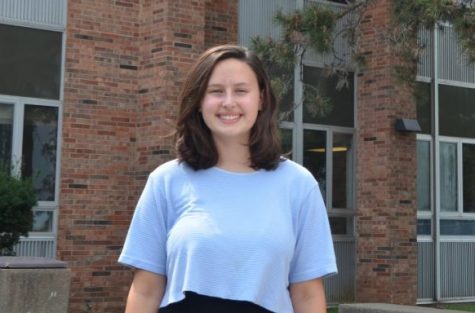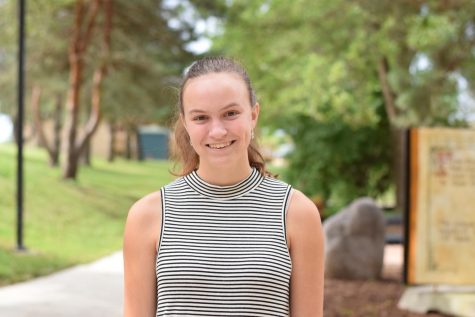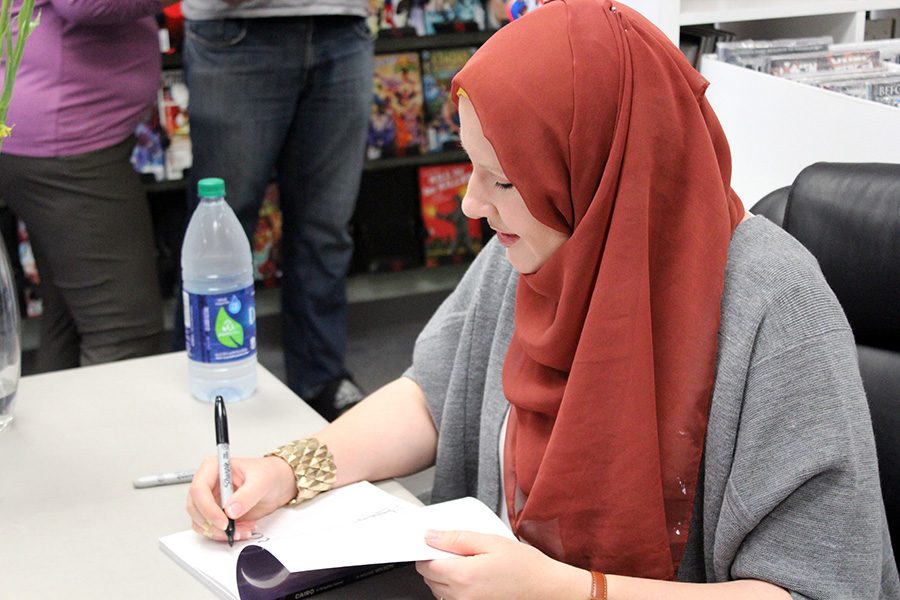A real life superhero at Hancher
Author of The Butterfly Mosque and Ms. Marvel comic series signed books and gave a lecture Oct 8.
When Marvel editors Stephen Wacker and Sana Amanat called G. Willow Wilson with the idea of creating a series surrounding a new female Muslim superhero, Wilson was already fearing the backlash from Islamophobic readers.
“I sort of sat there in silence for a little bit, tempted to tell them that they were going to have to hire an intern just to open all of the hate mail we were going to get if we really did this thing that they insisted we should do,” said Wilson.
Wilson had already been attacked online for work she had done with Marvel, which included writing fill-in issues of Superman. Most of these attacks were aimed at her just because she was a Muslim woman, so she imagined that there would be extreme backlash as a result of creating this superhero.
Wilson never expected the books to make the New York Times Bestsellers list for comics, or to create a fanbase that supported her and her story in ways she had never expected.
Fans in Iowa City had the opportunity to meet author G. Willow Wilson on Oct. 8 both at Hancher and Daydreams Comics. Wilson’s visit was part of the Iowa City Book Festival, taking place this year from Oct. 8-15. In addition to writing the Ms. Marvel comics, Wilson’s biography, The Butterfly Mosque, is being read for “One Community One Book,” an Iowa City reading program focused on education on human rights through literature.
At Hancher Auditorium, Wilson shared how the popular comics came to be, despite her own skepticism that a superhero with these qualities could be successful in the comic book world.
“A character like that was what I like to call the trifecta of death,” said Wilson. “The received wisdom at that point was the following things do not sell: new characters do not sell, female characters do not sell, minority characters do not sell. And this book would be all three of those things in a nice pretty package.”
However, Wilson also understood creating an original series with Marvel was an amazing opportunity, so she began the process of building her character and story.
As Wilson considered the directions she could go, in the back of her mind, she also had not accepted that it would be successful as an ongoing series.
After the Boston Marathon Bombing, a terrorist attack carried out by two radical Islamic brothers, Wilson almost gave up on the project, feeling that a fictional piece of work wouldn’t change people’s views.
“I was overcome by this sense of uselessness and despair. I felt, ‘I’m not gonna be able to do anything meaningful in a world that is like this,’” said Wilson.
But after that downfall, Wilson had a realization: in a world with such heinous villains, there needed to be a hero for everyone, and then the aspects of Kamala, the protagonist of Ms. Marvel, as a character began to take shape.
Comic readers of all backgrounds have been able to relate to Kamala. Eli Boonin-Vail, who witnessed her speech and went to her signing at Daydreams Comics that same day, had a very specific connection to Kamala.
“When I read the first volume, there’s this really pivotal moment where Kamala Khan has to decide whether she’s gonna save someone or not and she remembers this thing that her father told her, this sort of Muslim prayer about how if you save one life it’s like saving the world entirely…. I’m Jewish, and my Jewish grandmother always told me that growing up and I had this sort of incredible moment,” said Boonin-Vail.
Franklin Middle School student and Ms. Marvel fan Jessica Cline introduced G. Willow Wilson at Hancher. Cline views both Kamala and Wilson as heroes.
“G. Willow Wilson embodies everything I said Kamala embodies in us: her fearlessness, the beautiful, the brave, the weird, the different,” said Cline. “She’s just like everybody else, and yet has those little things that make her like the minority and the majority. And because she’s so relatable and her character is so relatable, it makes her writing feel like it’s part of my life.”
Your donation will support the student journalists of West High School. Your contribution will allow us to purchase Scholarship Yearbooks, newsroom equipment and cover our annual website hosting costs.

Natalie Dunlap is a senior and the Online Editor-in-Chief for the West Side Story. She is also involved in theatre and West High Democrats. When she's...

Teya Kerns is a sophomore at West High. It is her first year on the staff of the West Side Story newspaper as a photographer. In her free time Teya enjoys...



